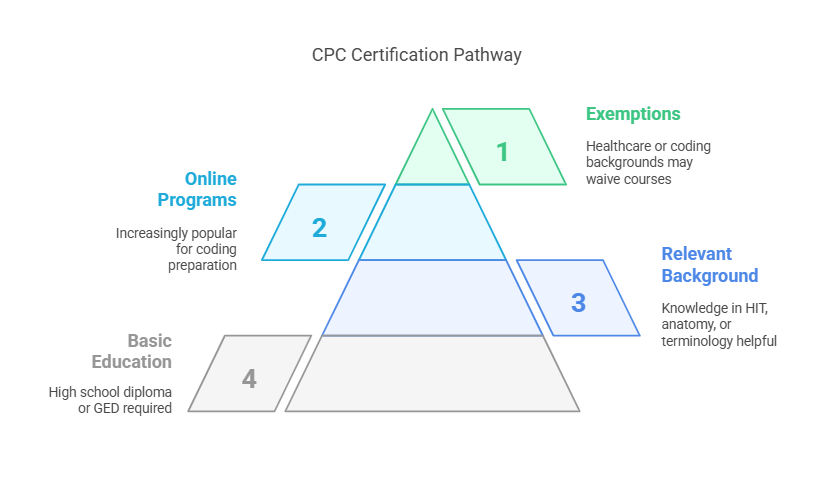How to Get CPC Certification
If you're wondering how to get CPC certification in 2025, you're in the right place. Earning a Certified Professional Coder (CPC) credential is a smart move for anyone looking to grow in the healthcare coding field, particularly in outpatient services. This comprehensive guide walks you through the key steps—from understanding prerequisites and choosing the right training program, to taking the exam and maintaining your certification.

Why CPC Certification Matters in 2025
The CPC certification, awarded by the American Academy of Professional Coders (AAPC), continues to be the gold standard for medical billing and coding certification professionals, especially in outpatient settings like clinics and private practices. In 2025, this certification not only boosts your earning potential but also sets you apart in a job market where accuracy and compliance are critical. Coders with CPC credentials, such as those certified by AMBCI, often earn higher salaries and enjoy better job security compared to non-certified peers.
Prerequisites for CPC Certification
You don't need a college degree to pursue CPC certification. A high school diploma or GED is sufficient. However, having a background in Health Information Technology (HIT), anatomy, physiology, or medical terminology can give you a significant edge. In 2025, many candidates are opting for online preparatory programs that combine coding theory with practical application. While prior experience is not required, those with healthcare or coding backgrounds may be exempt from some foundational coursework.

Choosing the Right Medical Coding Program
To prepare for the CPC exam, enrolling in a reputable medical coding program is essential. Look for programs accredited by AAPC or AHIMA. Many institutions, like Cowley College and California State University San Bernardino, offer CPC-focused online courses. Some programs even include CPC exam vouchers and personalized mentorship. The AMBCI program, in particular, is gaining popularity for its career support, payment flexibility, and job placement guarantees.
Studying for the CPC Exam
Success in the CPC exam requires a strong grasp of medical terminology, coding guidelines, procedural coding, and code sets like CPT, ICD-10-CM, and HCPCS Level II. In 2025, many students use digital platforms that offer adaptive learning, practice quizzes, and real-time feedback. Practice exams are especially important as they help you become familiar with the test format and timing. CPC aspirants are encouraged to focus on weak areas and use AAPC’s online resources and forums for support.
Taking and Passing the CPC Exam
The CPC exam is now 100 questions long and must be completed in four hours. It remains an open-book test, but only approved coding manuals (without sticky notes or printed inserts) are allowed. To pass, you must correctly answer at least 70 questions. AAPC allows retakes, and your initial exam fee typically includes one free attempt. Over 80% of candidates pass on their first try, especially those who prepare with practice tests and study consistently.

Transitioning from CPC-A to Full CPC
After passing the exam, you’ll be designated as a CPC-A (Apprentice). To remove the “A” and become a full CPC, you’ll need two years of professional coding experience and two letters of recommendation from industry professionals. Some programs like AMBCI offer apprenticeships or internships that help meet these requirements faster.
Maintaining CPC Certification
In 2025, maintaining your CPC certification requires completing 36 Continuing Education Units (CEUs) every two years. These CEUs ensure you stay current with updates in coding standards and healthcare regulations. You must also renew your AAPC membership annually and report your CEUs on time to avoid late fees or status expiration.
Career Opportunities for CPCs
With CPC certification, you can explore various roles such as Certified Inpatient Coder (CIC), Certified Risk Adjustment Coder (CRC), or Certified Evaluation and Management Coder (CEMC). The demand for certified coders is growing due to an aging population and increased documentation needs. Coders can work in hospitals, urgent care centers, insurance companies, or remotely from home. In 2025, the average salary for CPCs is around $60,000, with many earning more based on location and experience.

Six Lesser-Known Facts About CPC Certification
CPCs Can Work Internationally: The CPC certification is recognized globally, enhancing job prospects in various countries. CLRN
Veterans Can Use GI Bill for CPC Training: AAPC offers courses that may be eligible for GI Bill funding.
You Don’t Need Prior Healthcare Experience: AAPC's training programs are designed for individuals transitioning from non-medical fields. AAPC
AAPC Offers Specialty Credentials: Beyond the CPC, AAPC provides credentials in various specialties, including cardiology, dermatology, and general surgery coding. AAPC
AAPC Student Membership is Cheaper: AAPC offers discounted membership rates for students, providing full benefits at a reduced cost.
Coding Jobs Are Available on AAPC’s Job Board: AAPC's job board frequently lists opportunities for CPC-certified professionals.
Frequently Asked Questions
-
Most reputable programs include an AAPC exam voucher (valued up to $399), reducing your out-of-pocket costs significantly.
-
Yes, AAPC now allows online CPC exam attempts with live remote proctoring, offering convenience for those who can’t travel.
-
On average, total costs range between $1,200–$2,500, including tuition, exam fees, books, and membership.
-
Yes, AMBCI offers a 14-day full refund policy and a 6-month job placement guarantee or tuition reimbursement.
-
You can complete training and certification in as little as 6–9 months, depending on your pace and study time.
